#and the fact that it takes 10 episodes for our socially anxious protagonist
Explore tagged Tumblr posts
Text
So I know I'm showing up like two years late to this show with my Starbucks in hand but Cherry Magic is so fucking cute and i want a beings AU where Kurosawa is part dragon. And maybe where Tsuge is part werewolf.
#it has its flaws but like#over all 8/10#will probably watch again#points deducted for the weird b plot romance stalking moment#and the fact that it takes 10 episodes for our socially anxious protagonist#to wonder if reading his boyfriend's mind is weird and invasive#that last one i'm chalking up to serialization issues
3 notes
·
View notes
Note
What's Haikyuu about? I already know it's about volleyball.
Hmm. Okay, i’ll try to explain it.
it’s basically the story of these two guys trying to make their school team be the best in Japan??
The story basically begins with the lead character (and my second favourite character of all time) hinata shouyou on his way to junior high school when he is momentarily taken by a volleyball nationals match between a school called Karasuno and some other irrelevant filler school playing on tv inside a shop’s window..namely, he’s taken by this short player from Karasuno nicknamed ‘the little giant’ who seems to be scoring points despite his obvious height disadvantage. In that moment little shouyou falls in love with volleyball and starts idolizing the little giant, so he asks about the club at school and it turns out no one signed up and everything is really sad and he can’t play volleyball in a team and he is literally the only sad ass member?? he still practices alone though, and asks annoys his friends to help him occasionally. All of this in hopes that he will once get lucky enough to compete on a court one day..and when the day finally comes, he and his little chibi ass friends (whom he dragged to play with him despite them literally knowing 0 about volleyball) get SMASHED to pieces by the strongest junior high team in the prefecture. Worth mentioning, hinata and his anxious pee habit made him meet this guy nicknamed ‘the king of the court’ (supposedly just because he is an insanely gifted player) next to the bathroom and he ends making this dumb ass promise to literally a genius guy who is backed up by the strongest team while hinata’s best player is a guy who didn’t fuckin know what the position names meant
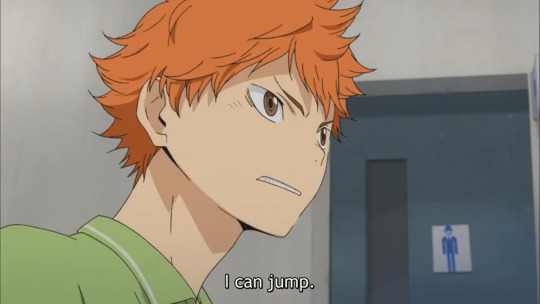
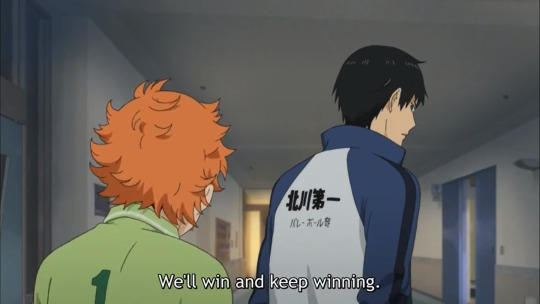
turns out au volleyball sasuke/haru/depending on what type of anime you like doesn’t like the idea of losing so he FIRES back

you’d think because hinata is a shonen protagonist he’d end up pulling some superhuman miracle and win but lol
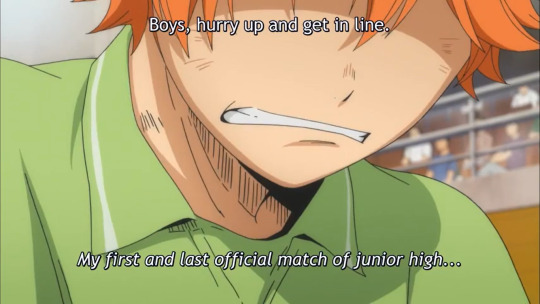
in typical #shonenboiishatelosing fashion he makes this promise to angry intense bathroom guy

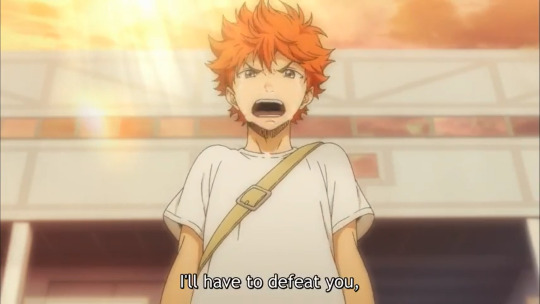

kageyama tobio aka king of our hearts is just really confused as to why Frodo the hobbit is crying and telling him all of this
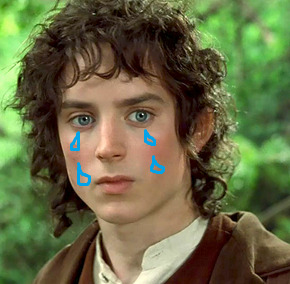

but in good sportsmen ship just tells him to get stronger if he wants to stay on court.
After hinata’s heart glass gets shattered he goes back to practice vv hard, montage and everything, in order to beat the king that cut his career short.
Fast forward to high school and hinata joins his dream school karasuno and he is all ‘im going to get so strong im going to have a great team and im gonna gET MY REVEN- WHAT THE FUCK WHY IS HE HERE’

turns out kageyama is actually rlly fuckin school dumb and his shitty grades (and even shittier personality) kept him from going to the strongest high school in their prefecture despite him being a genius at tossin u the ball (something we all can do but he can apparently do it ingeniously????) so he is stuck here bc of his angsty really bossy social skills mess hated by everyone back story
at first they are all at each others throats but slowly by slowly their relationship develops into some borderline romantic comedy power duo (literally nicknamed the freak duo by their opponents) plot (that a lot of people including me otp bc honestly it gets p gay sometimes like wow is this the power of friendship or the power of boyfriends the line is getting blurry)
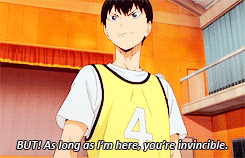
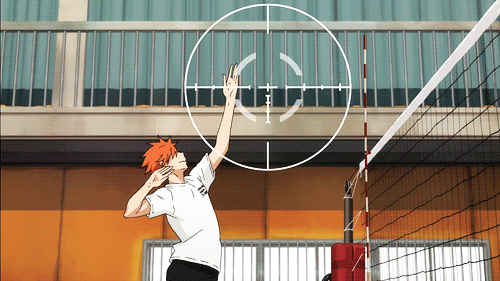
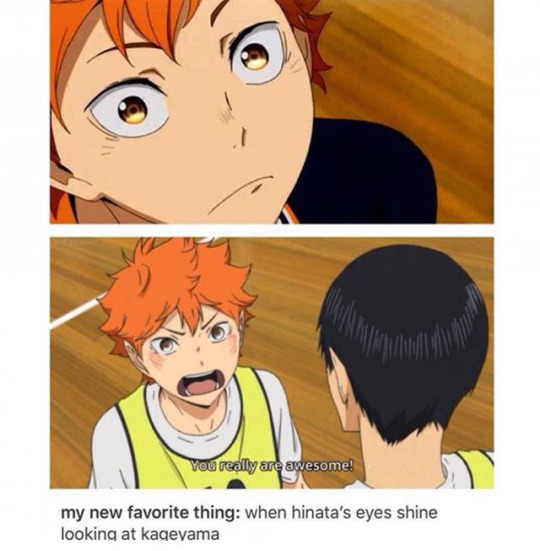
like uh they literally communicate like this??? but still understand each other

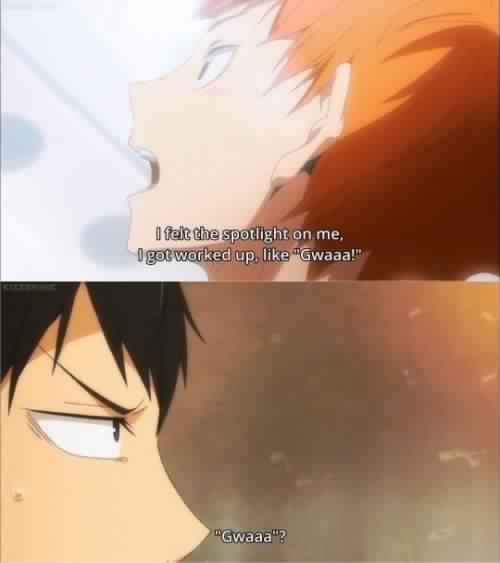

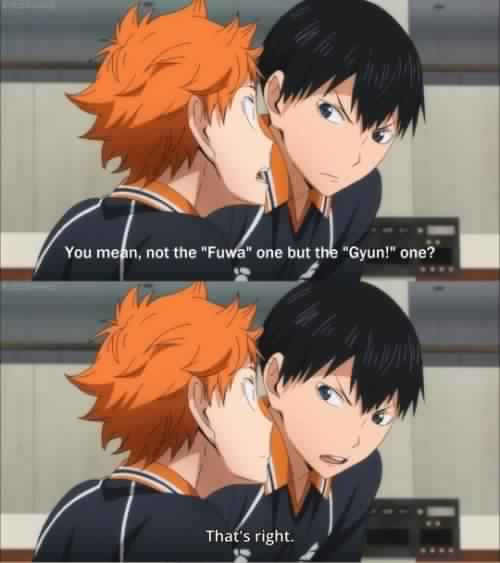
so using the power of friendship boyfriends and hinatas super fly jump they set out to take karasuno to the nationals. Along the way ofc there are other teams and characters we meet, all of which are explored and amazingly developed by the author. You literally cannot hate any of them even when they are the opposing team???
So that is basically hq??? a lot of volley?? a lot of friendship plots? a lot of amazing side characters that the author actually develops and includes constantly. There is also the bonus of the most chill (v active and full of amazing creators!!!!) fandom that is all in for any type of hc’s, ships, faves etc etc. It’s all love and chillness.
This series is like A+. Dynamic writing that never not once got boring or felt cheap? it’s always authentic and manages to increase the tension while remaining personal to the characters and their goals. Only Furudate manages to give a character a MILE of believable development DURING a match. Great series that will make you laugh 24/7, the animation is AMAZING holy actual heck..To animate a SINGLE frame of Hinata’s eye the animators used SIXTY different drawings??? In contrast to SP that animates using 1 to 2 drawings for FULL body frames??? The OST is also A++. you’ll start the series thinking ‘who cares about volleyball???’ and 10 in episodes you’re crying because you’ve adopted 20 fictional children and because ‘humans don’t have wings so they look for ways to fly’.
Fun fact: in the OFFICIAL made by Japanese people 100 best anime of all time list, Haikyuu!! was there!! Even shows like naruto weren’t!! that is how highly regarded it is…it’s vvvv popular?? specially in Japan it is everywhere.
in summary: 2 boys 1 ball
watch haikyuu!! trust me
#haikyuu!!#hinata shouyou#kageyama tobio#kagehina#karasuno#this is just me ranting about hq#long post#team7fangirl
247 notes
·
View notes
Text
Me; A History
Feel free to ignore this, unless you want to gain insight into my madness. It is very long - but I need some catharsis. I think, over the years, I have honed what I like to refer to as "Diplomatic Indifference" My mother likes to call it sociopathy, I imagine she'd know. I was (allegedly) a wretched child with too many emotions, and my mother, after divorcing my brother's father, and dealing with mine almost dying, found childhood behaviors reprehensible. It did not help, that I was immensely charming with strangers, (A trait which I inhereted from both my parents) and a bit too clever for my own good... My dad read to me every single night, I could recognize words on sight at 16 months of age. I remember being so thrilled with myself, at that age, spelling "THE" with those stupid alphabet magnets. It thrilled my father too. I was reading children's books by age three, "chapter books" by four, by eight I had devoured The Hobbit, Lord of the Rings, and Hitch Hiker's Guide. I was fully aware of proper grammar, spelling, and punctuation. I had thorough hatred for repetition in writing. At 9, I began my first novel. I remember almost everything about it even today. You see, because I was cleverer than most my age, it was expected, that I behave the part - without being a smart-ass. I look at it now an realize that I was never allowed to actually be a child. It was unacceptable, and every action that was in way child-like was looked at as a slight against nature. Yes I "got into things" as she put it, and yes, I would lie. But all kids do this... The family therapist did all the tests imaginable, and it was determined that I was intelligent, and maybe a little weird. "Weird" was my official diagnosis. I was bullied relentlessly by my peers... I had few friends, but I never cared until they started taking away my books because an 8 year old should not be reading anything more advance than Judy Bloom. My homeroom teacher for third grade was... well, lets just say we had direct access to an unused chem-lab, and he had a fucked up way of "punishing" the girls. I was easily bored with his class, and would frequently fail to turn in my homework... This was cause for "punishment" at least twice, that I fully recall. (FFS I was 8, it was horrid, and I didn't know it was unapproved methodology) That was the year the anxiety problems began oddly enough. I refused from then on to participate in any classroom activity that required me to be actively social with my teachers... The bullying sinched my dislike for my peers. I withdrew and found other ways of being mischivous at home. This led to my mother's tried and true discipline of restriction and copying the bible. Word for word... Needless to say, this only helped to spur my desire to write. I would steal pages out of the back of the notebook and use the tiny sliver of light that came into my bedroom from the street lamp, to write in the dead of night. Thus began the severe insomnia. I was over-protected. If I had friends, I was never to give them our phone number. I could never attend birthday parties, or other events. I was socially alienated from the world at an age when I should have been acquiring social skills. Until college, it is safe to say my only friend was my dad. High school, proved to be further traumatic. I was terrified of it before I even started. My older brother had taken up alcohol, weed, and self-harm in high school. But nobody bothered to notice until things went too far. Oddly enough, instead of screaming like a banshee at him, she sat on his bed and cried with him. Being asthmatic, I had simple triggers that would land me in the hospital, allergy, exercise, stress... High school was endlessly stressful. I had a math teacher (also the football coach) who thought that cussing in class made him cool, made the students like him. I found it to be stupid and distracting. But I mentioned it to the school councelor once, and he decided to single me out by name, as if I wasn't a social paraiah already. Then there was the history teacher, with whom I bantered in class. He seemed to appreciate my intellect, and a well formed debate. One day he kept me after class and I missed my bus home... he offered to drive me home. I was of course apprehensive, thankfully he asked me to take the roll sheet to the office, where I attempted to contact my mother. She didn't answer. So I tried my brother, but his room-mate and best friend (Who is now my only brother - the real one joined a cult and disowned us.) Answered, he offered to come get me. I went back to the classroom to retrieve my belongings. I told the teacher I had procured a ride home, to which he responded "Well then, I hope we don't find you chopped up in little bits in a ditch somewhere." This effectively drove me to making myself ill, I wound up in hospital for three weeks, being unable to breathe. I eventually wound up being on Independant Study for the remainder of my high school career. Which suited me well enough, I learned better on my own, and what I couldn't do alone, my father taught me. But this further secluded me from social norms. I was with my mother 24/7 which was never good, as neither of us could manage being in the other's company longer than 10 minutes without some sort of verbal sparring. I did graduate several months early, which wasof course lovely for me if not for anyone else. Now my psychiatric history, is far less telling about myself... I started therapy at age 11, and again the official diagnosis was simply that I was clever, creative, and weird. "Of course I hear voices in my head... They are the characters I put to paper." When my mother decided that my child-like behavior was psychosis, she took my to a psychiatrist... Clearly I needed to be drugged out of my skull. I was put on almost everything at one time or another, but nothing did anything except the anti-anxiety medications, which finally cornered my anxiety disorder. It was the antipsychotics which I should never have been on that really messed me up. I had been a wretchedly skinny child. Tall, but underweight. I was 5 foot 4 and only 86 pounds at point... But I was put on Welbutrin at 13 - in a matter of 9 months, I went from a size zero, to a size 12. In the next year between the drug, and puberty, I topped at a size 18. My own mother began to mock my weight, she attributed it all to my horrible eating habits alone. Eventually I began to refuse the medication, knowing full well that that was the cause of the weight gain. After several months of being off the drugs, I slimmed down to a size 9, for several years, and I was happy there. Unfortunatey, other things began to hit. I had begun to notice more that my mother mocked me at every turn, she freqently informed me that She might love me, but she doesn't like me. I was lonely, friendless, and sleep deprived. I became depressed, and more anxious than ever, but I still refused to be medicated. I followed in my brother's footsteps only as far as self-harm... when it was discovered my mother insisted I was doing it to get attention. She insisted, demanded and strong-armed me into being medicated again. (I never outgrew the self-harm "phase" I just got better at hiding it.) Eventually the norm became my masks and lies. There was nothing I hated more than being medicated. I attempted to be a social person, much to my own detriment. The only thing I managed to keep in check was my writing. My only solace. I joined a twitter RPG, and met a small circle of women, who became my chosen sisters. I was one of the youngest, but our youngest was only 18. Her name was Beth. Being as mine is Josephine, she and I formed an instant bond over the fact that we shared the names of the protagonist and her most beloved sister in Little Women. And truly that was our relationship. She was shy, and brilliant and perfect, and I would have done absolutely anything for her, as she kept my head on my shoulders. Beth's father died of cancer when she was only 5. Her mother physically and psychologically abused her until she finally left for University. I day I was only too happy to witness. We were as close as to people living on opposite sides of the world could be. She was my baby sister, and that was all there was too it. Unfortunately, just as in Little Women, I lost my Bess. IT hat been a bad year for her. First with her disappearance during the 2012 London Games. She had tickets and attended the opening ceremony, and suddenly dropped off the face of the planet for two weeks. We were naturally frantic. She eventually got back in touch once she "came too" she was somewhere well out of the UK, with no knowledge of how she got there, what had happened, or where she'd been. This episode managed to land her in a psychiatric hospital for three months. She hadn't been eating, thus diagnosed with an eating disorder, she told me, and I fully believed her, that she just forgot to eat most of the time because she was never hungry. She'd been drinking vodka like it was water, diagnosis - alcoholism. Eventually she went to a private psychiatrist who finally correctly diagnosed her with PTSD. Everything she'd gone through with her mother... even I had that diagnosis pegged, an that was before I adopted abnormal psychology and nursing as my major/minor. Her "boyfriend" at the time refused to research PTSD, and after the hospitalization, she was worse for wear. He had begun to treat her like a doormat, and eventually broke up with her because she wasn't feeling well enough to fuck him whenever he wanted it. The breakup was hard. She always wore her heart on her sleeve, and shared it openly with anyone who was kind to her. After that prick left, she became angry for a good while. Even she and I had a short falling out, because someone told her some lie about me. It eventually cleared up, when she started thinking straight again. Not long after, she met a nice young Scot named Thomas... he was good to her, he understood her illness, and he worshipped the ground she walked on. She was quite suddenly back to her sweet self. They weren't together long before he proposed, and she said yes. I was so pleased for her, just perfectly happy to see her FINALLY being loved the way she deserved. She went to his family's home in Scotland for Christmas, she said they were strange, but she loved them - and they her. On yule, she sent out her traditional Christmas emails. Regaling us with her adventures with her fiance. She sounded so joyous. On boxing day I recieved a message on facebook... Thomas told me she had passed away. I felt certain it was some sick joke, and ignored it for three days. I emailed, messaged, texted, called. To no avail... Finally I messaged Thomas back, asking if it was a joke, or if he had been hacked. He didn't respond. I rallied the forces, and we called around to her house-mates and got our answer. On the 23rd Tom and his parents went out, leaving Bess to relax a little. When they came home they found her on the floor, wrists slit. In February we managed to get all the details. Beth had decided to fogive her ex for treating her like shit while they were together, so she sent him a christmas email, like she did with all of us. He had written back to tell her that he never liked her, the only thing she had been good for was a quick shag, and a free meal. He told her he never wanted to speak to her again, and to stay out of his life. This pushed her over the edge... He killed her. Gods help me that BOY never wants to meet me in a dark alley, or a brightly lit police station. Because my reaction will be the same in either place. If his head remains on his shoulders, his own prick will be jammed down his throat... In one swift motion I lost my baby sister, my best friend, my editor, and my co-author. I was in hysterics. I could not be consoled. I was screaming and sobbing for days. They nearly had me committed (sectioned) I stopped writing, nothing that came out was any good. And I didn't have my sounding board anymore. It's taken me five years, to even get back to fan fiction - forget original work - I doubt I'll ever get back to that, heartbreaking though it is. Lately I've been more anxiety-ridden than I have been since I was a teenager. I've fallen to a desperate need for anti-anxiety and anti-depressants, my sleep is more erratic than I can ever remember it being, when I do sleep I'm generally plagued by nightmares. My body is failing me, I'm in constant pain, I can't seem to find any job locally, my medical licenses have lapsed, because I can't afford my CEU's and the renewal fees. I'm living with my parents, which makes the anxiety and depression worse. I have no friends - and gods help me I think I'm embracing my mother's diagnoses of me, because the only way to stay sane is to try not to care. I am a wreck. I'm miserable - and I have no one. Yet I keep on, because there are people who have it worse... there is always someone worse off. Despite the mask, I always care about everyone else. Whether they care about me or not.
2 notes
·
View notes
Text
Is My Patient Still Alive?
The modern-day health-care firmament is fighting one of its biggest battles of mistrust, the seeds of which have been sown over the years and the roots seem to run deep. There is a substantial misunderstanding about the complexities of intensive care treatments, especially the life support interventions. A critically ill patient on ventilator is often perceived by the families to be dead. Such misconceptions have a huge negative impact on the already friable doctor–patient relationship. The paper presents an overview of the problem and deliberates on the possible theories of such misunderstandings and chariness. An attempt is made to suggest the steps that could be taken to address this complicated issue.
A critically ill patient on ventilator is often perceived by the families to be dead. Such misconceptions have a significant negative influence on the already friable doctor–patient relationship. Open and frequent communication with complete transparency and increasing awareness about intensive care procedures and protocols will help quell such misunderstandings.
Healthcare in India has gone through a phenomenal change in the last two decades.
The corporate healthcare has especially been under the scanner and is witnessing one of its worst phases. The dark clouds of mistrust loom low and everyone seems to have serious doubts about the integrity of the noblest profession. Our fraternity, despite working hard, has lost the faith of the common man.
The ICUs are among the costliest and deal with the sickest patient in the hospital. Every intensivist would agree to have confronted the above-mentioned scenarios and the ever-increasing ire of anxious, nontrusting attendants.
“Is my patient still alive?” is the question, which my team is being routinely asked. In fact, the relatives literally mean – “We hope you are not keeping a dead patient on life supports.” The question is popping up more often than not and shows the change in the perception of the general public toward our profession.
In our country, it is a common misconception that ventilator means “end of life” and a person on ventilator is almost “expected” to die sooner or later. A critically ill patient by virtue of his clinical status, further complicated by multiorgan dysfunction and use of sedatives to keep him comfortable, is often perceived by the relatives as dead and being kept on life support systems only to mint money.
The timing of such question usually coincides with the patient not improving clinically, families facing financial crunch, and unpredictability looming large over the short-term and long-term expected outcome. The bewildered relatives are seen struggling to arrange for finances to ensure continuation of care in a private hospital versus trying to arrange a bed in a government-run ICU. The presence of acquaintances with half-baked knowledge whose prime interest is to provide unsolicited advice based on their whims and fallacies further confuses the relatives.
Why are we encountering this situation so often?
The principal and most notable reason explaining the above situation is the loss of trust, which is strongly influenced by the internet, social media, and the films. The contribution of “loose talks” and “medical jousting” cannot be disregarded.
Most ICUs are closed-door units and the general public is skeptical about what goes on inside the well-guarded walls. The limitation of visiting hours and the improper communication lay the foundation of mistrust.
Public confidence in healthcare is steadily eroding, and it is a global problem.[1] The creep of commercialism into medicine has been cited by Collier, as the most common reason for declining trust in the medical profession as a whole. Other cited explanations include media scandals that uncover gross incompetence or the covering up of mistakes and general skepticism about the altruism of doctors.[2]
Trust is built steadily in most situations. A recent meta-analysis by Birkhäuer et al. has found a positive correlation and better clinical outcomes when patients had higher trust in their health-care professional.[3]
The intensive care admission, on the contrary, is usually a medical emergency. The rapidly deteriorating clinical status along with the burden of expenses and unpredictability of outcome thwarts the process of trust building. The family is further stressed when they are required to take desperate decision for a patient who is unable to communicate by virtue of sick state.
It is ironic that Indians rather trust the Godmen, quacks, self-proclaimed “babas” and “tantriks,” and pharmacists, instead of the treating physicians.
In Scenario 1, the relatives had complete faith in a Godman and had serious doubts about the medical facts that we had put forth during each counseling session.
The easy accessibility of internet has undeniably helped us become more aware of the world around us. However, on the flip side, patients prefer to Google their clinical symptoms and therapeutic options before they even step into the hospital.
The medical fraternity is, however, concerned about potential misinformation and misinterpretation of health information available on the internet.[4]
The physicians do worry that the use of the Internet may lead to patient confusion, unrealistic expectations, and a potential increase in litigations.[5]
It is not uncommon to find news articles where the hospital is accused of keeping a patient on ventilator even after death.[6]
The social media too is filled with health information that is actively shared and believed as the truth. Moreover, this is not a trend that the millennials are setting. The older generation that is still discovering the ways of social media and the internet is under greater danger by imposing trust in unsolicited health information floating in the digital space. The unauthenticated health applications and availability of advice from the online communities further add to the confusion.
Traditional media houses have always been on the lookout for sensationalism and the medical community serves as a soft target.[7] There are so many success stories where the patients survived their critical illness due to timely intervention of the intensivists and the use of life support. The media, however, focuses only on one mishap and paints the entire medical community in a negative light.
Actor Aamir Khan and his TV show “Satyamev Jayate” had a phenomenal success among the masses but had a devastating impact on the image of medical profession in India. The episodes deviated from its purpose of creating awareness and tainted the image of doctors in a generalized fashion. The celebrity anchor's efforts to highlight malpractices in the medical field in India did upset the medical fraternity, but the viewers concurred that the “discreditable practices” were widespread and the actor was indeed doing a great service.[8]
Considering the current embitterment with the medical profession over the last few years, most Indians would be willing to implead themselves into the cases and provide evidence in support of Aamir Khan's views.
An interesting article by Flores, nearly a decade ago, explains that movies have a powerful influence on popular culture due to their international popularity, easy accessibility, and profitability as an industry. He also scripts that the negative portrayals of doctors are on the rise, and this is adversely impacting the patient's expectations and the doctor–patient relationship.[9,10]
“Gabbar is back,” a Bollywood film, released in 2015, shows the protagonist bring in a dead man to the hospital, requesting the doctors to save his life.[11] The hospital and its staff are shown asking for large sum of money to treat the patient and later declare him dead. The sequence may appear exaggerated, but it seems to find acceptance as a “real thing” in the minds of viewers. It being a mainstream production, the movie succeeds in manipulating the psyche of a common man and leads to the creation of a negative image of the medical fraternity. The mobbing of our hospital in Scenario 3 may have its roots tethered to such depictions.
At the other end is a movie (waiting, 2015) that is a beautiful and sensitive portrayal about the intensive care settings.[12] However, this film never enjoyed the same kind of attention despite very realistic portrayals by incredibly talented actors who deliver a truthful and very sensitive narration of what unfolds in the ICU.
The implications of casual or reckless statements made by an individual are many and have a very high likelihood of causing serious harm (Scenario 3). “Medical Jousting,” a term used to describe the criticism of patient's previous doctor, is a practice that has caused irreparable damage to our profession. This practice has further forced the public to view the medical profession with suspicious eyes and worsened the already poor doctor–patient relationship.[13,14]
How to deal with this situation?
The need of the hour is to be prepared for this question, and handle the situation with calm and patience. Evaluate the patient yourself first. Make a note of the aspects to be discussed, the evidence to be put forth and the possible questions, that may arise, and how to deal with them. The discussion is expected to be complex and not amenable to cookbook rules.
It is imperative to understand the intellect of a person one is trying to converse with. When faced with such a query, we have often asked the attendants a straight-faced question; “What do you understand by death?” We explain to them that, we label someone “dead” when a person is not responding, a person is not breathing, and the heart activity has stopped. They are further explained that their patient is unconscious by virtue of his/her sick clinical state and also due to the use of sedatives (wherever applicable). It is further clarified that although the ventilator is supporting the respiration, the patient's cardiac activity seen on the monitor is his own. The attendants are explained that a dead person would have a zero heart rate and a straight line on the monitor. One of our colleagues often makes the relatives palpate the pulse to show them the signs of life [Figures [Figures11 and and2].2]. Transiently, disconnecting the ventilator to demonstrate spontaneous breathing efforts helps. If the patient is not paralyzed, pinch and show them (attendants) a grimace, a motor movement, or an eye blink. The most challenging situation is when the patient is deeply comatose by virtue of his critical clinical state. We have witnessed situations, where the relatives have even doubted the parameters shown on the monitor as simulated.
It is very difficult to change their perception of what they wish to believe, but such interactions do put some lucidity into the gibberish situation. We document the same and place it as a part of the medical records.
For a patient going LAMA, we ensure to document the status at the time of shifting from the ICU, which includes the exact vital parameters. We document that all the therapies have been continued at the time of shifting. We have recently started pasting an electrocardiography strip and an arterial blood gas report taken just before shifting the patient out of ICU.
We have also dealt with a situation when the patient had to be woken up before her being taken LAMA just to prove that she was alive.
We all talk about sedation vacation as a tool to decrease ventilator-associated pneumonia, but to me, this is the only one intervention that makes the family believe the living status of the patient. Showing the family that the patient is waking up, moving his/her limbs is the only infallible way to make them believe that their patient is alive.
No further escalation of therapy is a safer option when compared with acute de-escalation, which results in immediate death and fortifies the ill perception of the family members (Scenario 2).
We have had sessions where we have tried to explain the family members the difference between death, brain death, and drug-induced comatose state.
Whenever we anticipate that the family members do not seem to trust us, we do give them the option of a second opinion and provide them with updated case record. We also arrange for multidisciplinary meet to address all the family members together and the minutes of the meeting are documented.
Is this situation preventable?
The patient admitted to the ICU is vulnerable and a roller coaster course is expected. Hold a family meeting early, preferably within 24 h of admission. The explanation should include the expected short-term and long-term outcomes. We discuss expected complications and need for life supports. If patient's family has reservation about any treatment option, the same needs to be documented. The institutional policy about fore-going of life support treatments should be discussed on a case merit basis. Preemptive discussion about the aggressiveness of institution of life supports and the resuscitation goal in a moribund patient saves the last minute predicament. Daily update about the clinical status does help in dealing with an unexpected deterioration. It does make sense to discuss the worst early during the course along with the proposed plan of management. Judicious identification and declaration of brain death and early discussion regarding end-of-life pathway in appropriate cases may prevent loss of trust of the aggrieved family members.[15] There are ample patient education initiatives about common medical and surgical conditions and psychological disorders, but there is a definitive paucity of information about critical care at least among the laypersons. The accessibility to awareness programs and explaining the families about what goes inside the ICU could help ward off misunderstandings. A simple explanation about the rationale of sedation may help the anxious relatives understand its significance. We have started conducting these sessions in our hospital where we try to answer their queries in as simple and straight terms as possible. We have realized that just being able to talk to intensivists outside the ICU helps families connect better with the treating team.
Conclusion
We need to accept that there are no simple answers to this intricate question. When a loved one is admitted in the ICU, the family and near and dears ones are mostly in a state of denial and shock about the extent of what the admission could mean. Their psychological state oscillates between imposing 100% trust in the treating team and the bouts of doubts that come during the lows. The medical jargon is tad overwhelming for a common man. It is here that the medical fraternity could make the entire process more humane. The complexities of intensive care can be made a bit easy to understand, and families must be reassured that the medical team is doing all it could in the best interest of the ailing patient. Open and frequent communication with total transparency helps sow the seeds of trust. Although the social media can be detrimental as far as spreading the misconceptions is concerned, the same medium holds a lot of power if used correctly. The reach and reinforcement offered should be tapped too. At the institutional level, the breach created by a perception of commercialization needs to be curbed. The medical fraternity needs to align together to re-establish its integrity and to regain the dwindling trust of the community.
Source: https://bit.ly/2RPcwTA
#patient#intensivecare#ventilator#icu_india#icu#doctor#doctor hospital humanity mankind health healthcare medical patientcare
0 notes